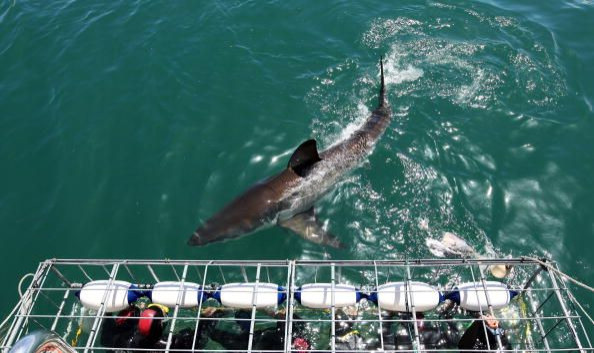Great White Shark Population Booms In British Columbia As Ocean Temperature Rises

Warmer oceans are reportedly expected to push great white sharks north to the coasts of Canada, according to research released Tuesday by the University of British Columbia (UBC).
Dr. William Cheung, an associate professor at the university’s Institute for the Oceans and Fisheries, cited climate change as the reason for more great white sharks to travel northeast to the Pacific and Atlantic Oceans.
READ: Shark Week 2017 Schedule: Wednesday Lineup Revealed
Climate change is reportedly making southern waters too warm for sharks to inhabit, according to the university. About 14 species already inhabit British Columbia’s waters and more are expected to arrive.
"Waters in British Columbia are going to get warmer so in the next 50 years we are going to see temperatures in the waters increasing by about 1.5 degrees Celsius," Cheung said, according to Globalnews.ca.
"That means some of the breeds of sharks that prefer warmer waters may come up to our coast."
Cheung referenced how the same species that inhabit California’s waters could make British Columbia home if carbon emissions and global warming worsen.
"If you look at the coast of California, it is expected that the types of species we see there could be in B.C. waters if we maintain at the status quo and do not mitigate carbon emissions," Cheung explained. "Species in California include the oceanic whitetip shark, and the great white shark. In the Atlantic, we would expect to see great whites along the coast of Newfoundland. Currently, they have been recorded, but sightings are rare."
READ: When Does Shark Week 2017 End?
Cheung’s research depicted a northern migration of southern aquatic species, like the great white shark. He said it's uncertain what will become of the six types of sharks that inhabited British Columbia’s waters such as: the Pacific sleeper shark, the brown cat shark, the spiny dog fish, the salmon shark, the tope (soupfin) shark and the blue shark.
Cheung said sharks globally, such as tropical breeds, will be pressured from climate change. The warmer oceans threatened their diet in tandem with over-fishing.
"That really tells us to think even more carefully about the need to find a proper conservation plan for some of these shark species," Cheung said.
John Volpe, a member of the University of Victoria’s environmental studies department, agreed with UBC’s calculations. He told Times Colonist Wednesday to consider the shark appearances as "episodes" instead of a northbound "wave" of southern aquatic life and increased ocean temperatures.
With rising ocean temperatures, it’s more precise to "consider geographic fingers of warm water extending and receding," sometimes "getting pinched off" in warm-water "bubbles" that hinder species, Volpe said.
Volpe cited that change in ocean temperatures created ecological instability. He added that appearances of warm-water creatures such as the great white are signs of "ecological destabilization," which are unpredictable.
"In these periods of constant change, even native species become destabilized and their long-term viability is no longer assured," Volpe said. "The physical environment upon which everything depends becomes destabilized.
He added, "The great white shark is big and scary, but it’s actually a harbinger of a change in fundamental ecological processes."
#Climatechange could bring #greatwhitesharks to #BC beaches. (@MichaelPhelps far behind) https://t.co/jD0hpbuQlq @nereusprogram @ubcnews pic.twitter.com/wbaY6NWfew
— UBC Oceans (@UBCoceans) July 25, 2017
© Copyright IBTimes 2024. All rights reserved.





















